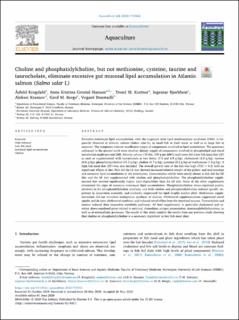| dc.contributor.author | Krogdahl, Åshild | |
| dc.contributor.author | Hansen, Anne Kristine Grostøl | |
| dc.contributor.author | Kortner, Trond M. | |
| dc.contributor.author | Björkhem, Ingemar | |
| dc.contributor.author | Krasnov, Aleksei | |
| dc.contributor.author | Berge, Gerd Marit | |
| dc.contributor.author | Denstadli, Vegard | |
| dc.date.accessioned | 2020-11-11T11:43:13Z | |
| dc.date.available | 2020-11-11T11:43:13Z | |
| dc.date.created | 2020-07-27T10:00:23Z | |
| dc.date.issued | 2020 | |
| dc.identifier.citation | Aquaculture, 2020, 528, 735552 | en_US |
| dc.identifier.issn | 0044-8486 | |
| dc.identifier.uri | https://hdl.handle.net/11250/2687368 | |
| dc.description.abstract | Excessive enterocyte lipid accumulation, with the suggested term lipid malabsorption syndrome (LMS), is frequently observed in Atlantic salmon (Salmo salar L), in small fish in fresh water as well as in large fish in seawater. The symptoms indicate insufficient supply of components involved in lipid assimilation. The questions addressed in the present work were whether dietary supply of components involved in phospholipid and sterol metabolism might prevent LMS. Atlantic salmon (35 fish, 330 g per 600 L tank) were fed a low fish meal diet (LF) as such or supplemented with taurocholate at two levels (3.5 and 6.9 g/kg), cholesterol (2.0 g/kg), taurine (0.8 g/kg), phosphatidylcholine (15.1 g/kg), choline (3.7 g/kg), cysteine (0.8 g/kg) or methionine (1.0 g/kg). A high fish meal diet (HF) was also included. The overall growth rate of the fish was high (TGC>4.2) with no significant effects of diet. Fish fed the LF diet showed increased relative weight of the pyloric and mid intestine and excessive lipid accumulation in the enterocytes, characteristics which were nearly absent in fish fed the HF diet and the LF diet supplemented with choline and phosphatidylcholine. The phosphatidylcholine supplemented diet showed significantly higher lipid digestibility than the LF diet. None of the other supplements eliminated the signs of excessive enterocyte lipid accumulation. Phosphatidylcholine down-regulated pcyt1a, involved in the phosphatidylcholine synthesis, and both choline and phosphatidylcholine induced apoaIV, important in lipoprotein assembly, and markedly suppressed the lipid droplet marker plin2. Methionine supplementation did not stimulate endogenous synthesis of choline. Cholesterol supplementation suppressed sterol uptake and de novo cholesterol synthesis, and induced sterol efflux from the intestinal mucosa. Taurocholate and taurine induced their respective metabolic pathways. All feed supplements, in particular cholesterol and cysteine, down-regulated genes related to antiviral, chemokine, antigen presentation, immunoglobulinfunctions, as well as of extracellular proteases. The results of this study confirm the results from our previous study showing that choline or phosphatidylcholine is a necessary ingredient in low fish meal diets. | en_US |
| dc.language.iso | eng | en_US |
| dc.rights | Attribution-NonCommercial-NoDerivatives 4.0 Internasjonal | * |
| dc.rights.uri | http://creativecommons.org/licenses/by-nc-nd/4.0/deed.no | * |
| dc.title | Choline and phosphatidylcholine, but not methionine, cysteine, taurine and taurocholate, eliminate excessive gut mucosal lipid accumulation in Atlantic salmon (Salmo salar L) | en_US |
| dc.type | Peer reviewed | en_US |
| dc.type | Journal article | en_US |
| dc.description.version | publishedVersion | en_US |
| dc.source.volume | 528 | en_US |
| dc.source.journal | Aquaculture | en_US |
| dc.identifier.doi | 10.1016/j.aquaculture.2020.735552 | |
| dc.identifier.cristin | 1820548 | |
| dc.relation.project | Norges forskningsråd: 223108 | en_US |
| dc.source.articlenumber | 735552 | en_US |
| cristin.ispublished | true | |
| cristin.fulltext | original | |
| cristin.qualitycode | 1 | |

